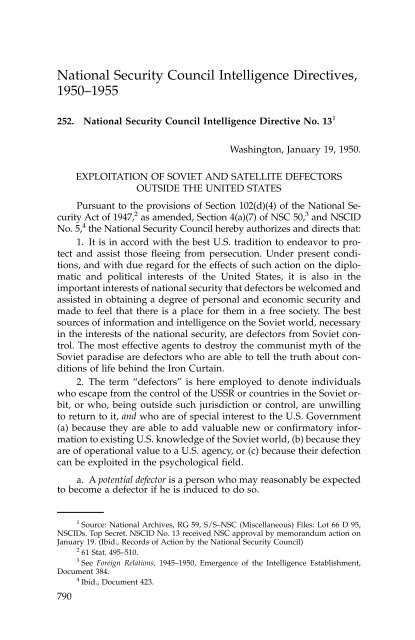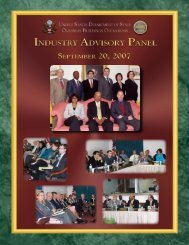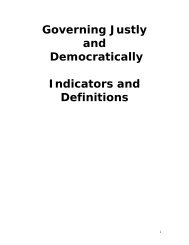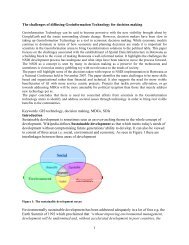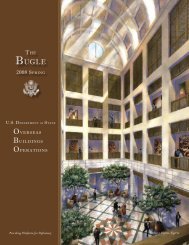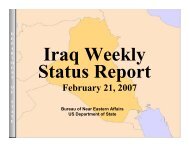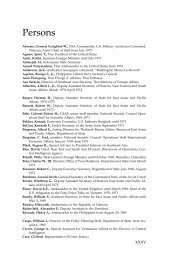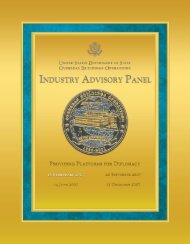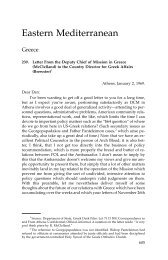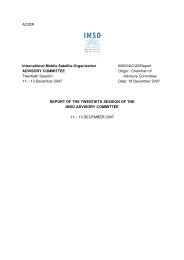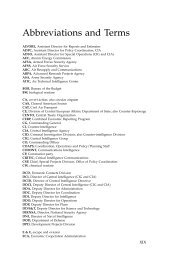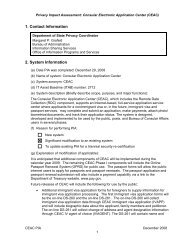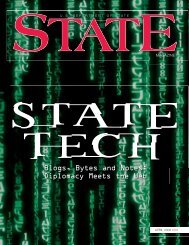NSCIDs - US Department of State
NSCIDs - US Department of State
NSCIDs - US Department of State
You also want an ePaper? Increase the reach of your titles
YUMPU automatically turns print PDFs into web optimized ePapers that Google loves.
National Security Council Intelligence Directives,<br />
1950–1955<br />
252. National Security Council Intelligence Directive No. 13 1<br />
Washington, January 19, 1950.<br />
EXPLOITATION OF SOVIET AND SATELLITE DEFECTORS<br />
OUTSIDE THE UNITED STATES<br />
Pursuant to the provisions <strong>of</strong> Section 102(d)(4) <strong>of</strong> the National Security<br />
Act <strong>of</strong> 1947, 2 as amended, Section 4(a)(7) <strong>of</strong> NSC 50, 3 and NSCID<br />
No. 5, 4 the National Security Council hereby authorizes and directs that:<br />
1. It is in accord with the best U.S. tradition to endeavor to protect<br />
and assist those fleeing from persecution. Under present conditions,<br />
and with due regard for the effects <strong>of</strong> such action on the diplomatic<br />
and political interests <strong>of</strong> the United <strong>State</strong>s, it is also in the<br />
important interests <strong>of</strong> national security that defectors be welcomed and<br />
assisted in obtaining a degree <strong>of</strong> personal and economic security and<br />
made to feel that there is a place for them in a free society. The best<br />
sources <strong>of</strong> information and intelligence on the Soviet world, necessary<br />
in the interests <strong>of</strong> the national security, are defectors from Soviet control.<br />
The most effective agents to destroy the communist myth <strong>of</strong> the<br />
Soviet paradise are defectors who are able to tell the truth about conditions<br />
<strong>of</strong> life behind the Iron Curtain.<br />
2. The term “defectors” is here employed to denote individuals<br />
who escape from the control <strong>of</strong> the <strong>US</strong>SR or countries in the Soviet orbit,<br />
or who, being outside such jurisdiction or control, are unwilling<br />
to return to it, and who are <strong>of</strong> special interest to the U.S. Government<br />
(a) because they are able to add valuable new or confirmatory information<br />
to existing U.S. knowledge <strong>of</strong> the Soviet world, (b) because they<br />
are <strong>of</strong> operational value to a U.S. agency, or (c) because their defection<br />
can be exploited in the psychological field.<br />
a. A potential defector is a person who may reasonably be expected<br />
to become a defector if he is induced to do so.<br />
1<br />
Source: National Archives, RG 59, S/S–NSC (Miscellaneous) Files: Lot 66 D 95,<br />
<strong>NSCIDs</strong>. Top Secret. NSCID No. 13 received NSC approval by memorandum action on<br />
January 19. (Ibid., Records <strong>of</strong> Action by the National Security Council)<br />
2<br />
61 Stat. 495–510.<br />
3<br />
See Foreign Relations, 1945–1950, Emergence <strong>of</strong> the Intelligence Establishment,<br />
Document 384.<br />
4<br />
Ibid., Document 423.<br />
790
<strong>NSCIDs</strong> 791<br />
b. A declared defector is a person who has left the service <strong>of</strong> his<br />
country and therefore requires protection and assistance.<br />
c. Inducement means the commission <strong>of</strong> an act by, or manifestly at<br />
the instigation <strong>of</strong>, an American <strong>of</strong>ficial which is demonstrably intended<br />
to bring about a defection and for which the U.S. Government might,<br />
if the act were discovered, be called upon to account.<br />
Potential Defectors<br />
3. CIA shall be responsible for inducing the defection <strong>of</strong> potential<br />
defectors, except in the cases where it is manifestly in the interest <strong>of</strong><br />
security or efficiency that representatives <strong>of</strong> other agencies undertake<br />
such action.<br />
Declared Defectors<br />
4. The ranking American <strong>of</strong>ficial in the area concerned shall be responsible<br />
for determining the manner and degree to which the acceptance<br />
or rejection <strong>of</strong> a declared defector may affect the diplomatic<br />
and political interests <strong>of</strong> the United <strong>State</strong>s. Any overt publicity and<br />
propaganda exploitation <strong>of</strong> a defector shall be coordinated with the<br />
<strong>Department</strong> <strong>of</strong> <strong>State</strong>.<br />
5. The Central Intelligence Agency shall be responsible for the<br />
covert exploitation <strong>of</strong> defectors, and shall, within the framework <strong>of</strong><br />
paragraph 4, coordinate all matters concerned with the handling and<br />
disposition <strong>of</strong> declared defectors from the Soviet Union and the satellite<br />
states in order to assure the effective exploitation <strong>of</strong> all defectors<br />
for operational, intelligence, or psychological purposes by the U.S. Government.<br />
6. CIA shall seek the guidance <strong>of</strong> the appropriate <strong>Department</strong>s to<br />
insure that no action taken under this directive jeopardizes the military,<br />
security, political, or diplomatic interests <strong>of</strong> the United <strong>State</strong>s and<br />
shall keep the other IAC agencies adequately informed <strong>of</strong> actions taken<br />
with respect to individual defector cases.<br />
7. Subject to the over-all direction <strong>of</strong> the Chief <strong>of</strong> Mission, CIA<br />
representatives in the field shall have operating responsibility outside<br />
U.S. occupied areas for:<br />
a. Providing secure facilities and preliminary assessment <strong>of</strong> a defector’s<br />
bona fides and his intelligence or other potential value to the<br />
U.S. Government.<br />
b. Assuring that the other IAC agencies have adequate opportunity<br />
to exploit a defector for intelligence or operational purposes, including<br />
immediate access to the defector in the field.<br />
c. Arranging secure movement <strong>of</strong> defectors as required.<br />
8. In U.S. occupied areas CIA shall establish, together with the <strong>Department</strong><br />
<strong>of</strong> <strong>State</strong> and that military department having executive authority<br />
in the area, adequate procedures designed to carry out the obligations<br />
listed in paragraphs 7 a–c.
792 Foreign Relations, 1950–1955<br />
9. Field representatives <strong>of</strong> the IAC agencies shall be responsible for:<br />
a. Informing promptly the ranking American <strong>of</strong>ficial and the CIA<br />
representative <strong>of</strong> any potential or declared defector who comes to their<br />
attention.<br />
b. Directly or through questionnaires, representing the intelligence<br />
interests <strong>of</strong> their respective agencies in the debriefing <strong>of</strong> such<br />
defectors.<br />
10. To the extent that there are available funds, CIA shall be responsible<br />
for the final disposal and rehabilitation <strong>of</strong> defectors. The IAC<br />
agencies shall provide all possible assistance to CIA in establishing<br />
rapid and effective means <strong>of</strong> disposal.<br />
11. If it appears to be in the national interest to bring a defector<br />
to the United <strong>State</strong>s for intelligence purposes or operational use, CIA<br />
shall be responsible for coordinating with the interested departments<br />
and agencies for policy approval and for making necessary arrangements<br />
in advance for entry. CIA shall also be responsible for handling<br />
and disposal <strong>of</strong> the defector in agreement with the interested departments<br />
or agencies. In each case, notice and full available biographic<br />
and background information will be given to the Federal Bureau <strong>of</strong> Investigation<br />
in advance. No commitments for entry for intelligence purposes<br />
or operational use will be made by any United <strong>State</strong>s <strong>of</strong>ficial<br />
without coordination and notice as set forth in this paragraph.<br />
253. National Security Council Intelligence Directive No. 14 1<br />
Washington, March 3, 1950.<br />
EXPLOITATION OF DEFECTORS AND OTHER ALIENS WITHIN<br />
THE UNITED STATES<br />
Pursuant to the provisions <strong>of</strong> the National Security Act <strong>of</strong> 1947, 2<br />
as amended, and Section 4 <strong>of</strong> NSC 50, 3 the National Security Council,<br />
1<br />
Source: National Archives, RG 59, S/S–NSC (Miscellaneous) Files: Lot 66 D 95,<br />
<strong>NSCIDs</strong>. Top Secret. NSCID No. 14 received NSC approval by memorandum action on<br />
March 3. (Ibid., Records <strong>of</strong> Action by the National Security Council)<br />
2<br />
61 Stat. 495–510.<br />
3<br />
See Foreign Relations, 1945–1950, Emergence <strong>of</strong> the Intelligence Establishment,<br />
Document 384.
<strong>NSCIDs</strong> 793<br />
with the concurrence <strong>of</strong> the Attorney General <strong>of</strong> the United <strong>State</strong>s,<br />
hereby authorizes and directs that:<br />
1. Exploitation <strong>of</strong> aliens within the U.S. for internal security purposes<br />
shall be the responsibility <strong>of</strong> the Federal Bureau <strong>of</strong> Investigation.<br />
Exploitation <strong>of</strong> aliens as sources <strong>of</strong> foreign intelligence information or<br />
for other foreign intelligence purposes shall be the responsibility <strong>of</strong> the<br />
Central Intelligence Agency. This allocation to the Federal Bureau <strong>of</strong><br />
Investigation and to the Central Intelligence Agency <strong>of</strong> separate areas<br />
<strong>of</strong> alien exploitation responsibility does not preclude joint exploitation,<br />
which must be encouraged whenever feasible. It further carries with it<br />
the obligation for each agency to give to the other, without delay and<br />
directly, all information pertinent to the activities and responsibilities<br />
<strong>of</strong> that other agency, such as the FBI notifying CIA promptly <strong>of</strong> aliens<br />
<strong>of</strong> potential foreign intelligence interest who may come to its attention<br />
and CIA notifying FBI <strong>of</strong> information it obtains relating to internal security<br />
problems.<br />
2. Exploitation <strong>of</strong> aliens by the Central Intelligence Agency or by<br />
the other member agencies <strong>of</strong> the Intelligence Advisory Committee<br />
shall be conducted for the following purposes:<br />
a. To obtain foreign intelligence information required in the interests<br />
<strong>of</strong> national security or by the member agencies <strong>of</strong> the Intelligence<br />
Advisory Committee.<br />
b. To obtain internal security information or other data required<br />
by the Federal Bureau <strong>of</strong> Investigation in the discharge <strong>of</strong> its domestic<br />
responsibilities.<br />
c. For such other purposes as the National Security Council shall<br />
deem to be in the interests <strong>of</strong> national security.<br />
3. In the case <strong>of</strong> any <strong>of</strong>ficial, employee, or other individual <strong>of</strong>ficially<br />
attached to a foreign government or one <strong>of</strong> its agencies, an <strong>of</strong>ficial<br />
<strong>of</strong> a political party <strong>of</strong>ficially recognized by its government, or an<br />
<strong>of</strong>ficial <strong>of</strong> an international organization, in an overt or covert capacity,<br />
who defects within the United <strong>State</strong>s, the Federal Bureau <strong>of</strong> Investigation<br />
shall:<br />
a. Immediately notify CIA, as well as the other IAC members and<br />
other interested agencies, <strong>of</strong> the actual or potential defection.<br />
b. Determine ins<strong>of</strong>ar as is possible the legitimacy <strong>of</strong> such reported<br />
potential or actual defection within the United <strong>State</strong>s, and whether the<br />
individual’s determination to defect or his defection is or is not known<br />
to his government.<br />
c. Immediately notify the Attorney General and the <strong>Department</strong><br />
<strong>of</strong> <strong>State</strong> <strong>of</strong> the identity <strong>of</strong> the individual concerned and his <strong>of</strong>ficial connection<br />
with a foreign government, as well as his status as a defector.<br />
Comments and observations will be solicited from the Attorney General<br />
and the <strong>State</strong> <strong>Department</strong>.
794 Foreign Relations, 1950–1955<br />
d. Be initially responsible for exploitation <strong>of</strong> all such actual or potential<br />
defectors, and maintain sole jurisdiction over them until completion<br />
<strong>of</strong> its internal security exploitation, unless it is jointly determined<br />
that the foreign intelligence interest shall be paramount in the<br />
particular case.<br />
e. Determine whether such potential defector can be utilized in a<br />
clandestine capacity and when so utilized provide through CIA, or the<br />
other interested agency, for satisfaction <strong>of</strong> foreign intelligence requirements.<br />
Appropriate security restrictions will be agreed upon in individual<br />
cases. If, for operational reasons, it is not possible for the FBI to<br />
immediately fulfill foreign intelligence requirements <strong>of</strong> the other<br />
agency, such notice will be provided to CIA and the other agency.<br />
f. Make immediately available to CIA with copies to interested<br />
IAC members all foreign intelligence information resulting from the<br />
initial exploitation <strong>of</strong> such a defector, and provide, through established<br />
channels, for his interview by other member agencies <strong>of</strong> the IAC upon<br />
their request, prior to the full exhaustion <strong>of</strong> internal security requirements<br />
if feasible.<br />
g. On request by CIA, arrange for the transfer <strong>of</strong> such a defector<br />
to the jurisdiction <strong>of</strong> the CIA upon completion <strong>of</strong> its internal security<br />
exploitation, unless it is jointly determined that the foreign intelligence<br />
interest is paramount prior to that time. The CIA will assume responsibility<br />
for necessary maintenance and custody during the period <strong>of</strong> its<br />
exploitation and shall be responsible for the final disposal and rehabilitation<br />
<strong>of</strong> all such defectors. Internal security problems will remain<br />
the responsibility <strong>of</strong> the Federal Bureau <strong>of</strong> Investigation. The final<br />
disposition <strong>of</strong> the alien and reimbursement <strong>of</strong> maintenance expenses<br />
will be determined by mutual agreement in advance among the CIA<br />
and interested agencies in each case, based upon future operational<br />
considerations.<br />
h. Pursuant to the provisions <strong>of</strong> Section 102(e) <strong>of</strong> the National Security<br />
Act <strong>of</strong> 1947, as amended, upon the written request <strong>of</strong> the Director<br />
<strong>of</strong> Central Intelligence, provide all available information and pertinent<br />
observations with respect to the internal security factors involved<br />
in the exploitation <strong>of</strong> each defector for foreign intelligence information.<br />
4. In the case <strong>of</strong> aliens within the U.S., other than those covered<br />
in paragraph 3 above, CIA shall:<br />
a. Be responsible for their exploitation for foreign intelligence under<br />
the provisions <strong>of</strong> NSCID No. 7. 4<br />
4 Ibid., Document 427.
<strong>NSCIDs</strong> 795<br />
b. In order that the statutory responsibilities and domestic intelligence<br />
jurisdiction <strong>of</strong> the Federal Bureau <strong>of</strong> Investigation may be adequately<br />
handled and in order to prevent confusion in internal security<br />
matters, the CIA or any other authorized intelligence agency will,<br />
prior to exploiting an alien within the United <strong>State</strong>s, advise the FBI in<br />
advance <strong>of</strong> the exploitation. The FBI will then provide information it<br />
has which may be <strong>of</strong> assistance in the exploitation by the other agency<br />
and will make such observations as are pertinent, including notice that<br />
exploitation by the other agency would interfere with matters involved<br />
in internal security or execution <strong>of</strong> the statutory obligations <strong>of</strong> the FBI.<br />
c. After determining priorities, arrange for exploitation <strong>of</strong> the alien<br />
for foreign intelligence purposes by any other IAC agency or agencies<br />
which may request independent exploitation <strong>of</strong> the alien. The CIA will<br />
assume responsibility for necessary maintenance and custody during<br />
the period <strong>of</strong> exploitation. During the period <strong>of</strong> such maintenance, internal<br />
security problems will remain the responsibility <strong>of</strong> the Federal<br />
Bureau <strong>of</strong> Investigation, except as is provided below. Reimbursement<br />
<strong>of</strong> maintenance expenses will be determined by mutual agreement in<br />
advance among the CIA and interested agencies in each case.<br />
d. Notify the FBI immediately <strong>of</strong> information obtained through its<br />
own facilities or from other IAC agencies that an alien within the U.S.<br />
has defected or may defect. To accomplish this end, the other IAC agencies<br />
will transmit without delay all such pertinent information to the<br />
CIA and the FBI.<br />
5. If it appears to be in the national interest to bring a defector to<br />
the United <strong>State</strong>s for intelligence purposes or operational use under<br />
the provisions <strong>of</strong> this Directive, CIA shall be responsible for coordinating<br />
with the other interested departments and agencies for policy<br />
approval and for making necessary arrangements in advance for entry.<br />
CIA shall also be responsible for handling and disposal <strong>of</strong> the defector<br />
in agreement with the interested departments or agencies, and<br />
until such disposal will make adequate provisions to insure that the<br />
defector does not endanger the internal security <strong>of</strong> the United <strong>State</strong>s.<br />
In each case, notice and full available biographic and background information<br />
will be given to the Federal Bureau <strong>of</strong> Investigation in advance.<br />
No commitments for entry for intelligence purposes or operational<br />
use will be made by any United <strong>State</strong>s <strong>of</strong>ficial without<br />
coordination and notice as set forth in this paragraph.<br />
6. Any overt publicity and propaganda exploitation <strong>of</strong> a defector<br />
shall be coordinated with the <strong>Department</strong> <strong>of</strong> <strong>State</strong>.
796 Foreign Relations, 1950–1955<br />
254. National Security Council Intelligence Directive No. 15 1<br />
Washington, June 13, 1951.<br />
COORDINATION AND PRODUCTION OF FOREIGN<br />
ECONOMIC INTELLIGENCE<br />
Pursuant to the provisions <strong>of</strong> Section 102 (d) <strong>of</strong> the National Security<br />
Act <strong>of</strong> 1947, 2 as amended, the National Security Council hereby<br />
authorizes and directs the Central Intelligence Agency to perform the<br />
following functions with respect to foreign economic intelligence relating<br />
to the national security:<br />
1. Maintain a continuing review <strong>of</strong> the requirements <strong>of</strong> the United<br />
<strong>State</strong>s Government for foreign economic intelligence relating to the national<br />
security, and <strong>of</strong> the facilities and arrangements available to meet<br />
those requirements, making from time to time such recommendations<br />
to the National Security Council concerning improvements as may require<br />
National Security Council action.<br />
2. Insure through regular procedures that the full economic<br />
knowledge and technical talent available in the Government is brought<br />
to bear on important issues involving national security, including issues<br />
on which assistance is requested by the National Security Council<br />
or members there<strong>of</strong>.<br />
3. Evaluate, through regular procedures, the pertinence, extent,<br />
and quality <strong>of</strong> the foreign economic data available bearing on national<br />
security issues, and develop ways in which quality could be improved<br />
and gaps could be filled.<br />
4. Conduct, as a service <strong>of</strong> common concern, such foreign economic<br />
research and produce such foreign economic intelligence as may<br />
be required (a) to supplement that produced by other agencies either<br />
in the appropriate discharge <strong>of</strong> their regular departmental missions or<br />
in fulfillment <strong>of</strong> assigned intelligence responsibilities; (b) to fulfill requests<br />
<strong>of</strong> the Intelligence Advisory Committee.<br />
1 Source: Truman Library, President’s Secretary Files, Subject File. Confidential.<br />
NSCID No. 15 was approved by the NSC at its 94th meeting on June 13 (NSC Action<br />
No. 495). (National Archives, RG 59, S/S–NSC (Miscellaneous) Files: Lot 66 D 95, Records<br />
<strong>of</strong> Action by the National Security Council) A correction to NSCID No. 15 was issued<br />
on June 22. The text was unchanged, the only change being a minor adjustment to<br />
format.<br />
2 61 Stat. 495–510.
<strong>NSCIDs</strong> 797<br />
255. National Security Council Intelligence Directive No. 5 Revised 1<br />
Washington, August 28, 1951.<br />
ESPIONAGE AND COUNTERESPIONAGE OPERATIONS<br />
Pursuant to the provisions <strong>of</strong> Section 102 (d) <strong>of</strong> the National Security<br />
Act <strong>of</strong> 1947, 2 the National Security Council hereby authorizes<br />
and directs that:<br />
1. The Director <strong>of</strong> Central Intelligence shall conduct all organized<br />
Federal espionage operations outside the United <strong>State</strong>s and its possessions<br />
for the collection <strong>of</strong> foreign intelligence information required<br />
to meet the needs <strong>of</strong> all <strong>Department</strong>s and Agencies concerned, in connection<br />
with the national security, except for certain agreed activities<br />
by other <strong>Department</strong>s and Agencies.<br />
2. The Director <strong>of</strong> Central Intelligence shall conduct all organized<br />
Federal counterespionage operations outside the United <strong>State</strong>s and its<br />
possessions and in occupied areas, provided that this authority shall<br />
not be construed to preclude the counter-intelligence activities <strong>of</strong> any<br />
army, navy or air command or installation and certain agreed activities<br />
by <strong>Department</strong>s and Agencies necessary for the security <strong>of</strong> such<br />
organizations.<br />
3. The Director <strong>of</strong> Central Intelligence shall be responsible for coordinating<br />
covert and overt intelligence collection activities.<br />
4. When casual agents are employed or otherwise utilized by an<br />
IAC <strong>Department</strong> or Agency in other than an overt capacity, the Director<br />
<strong>of</strong> Central Intelligence shall coordinate their activities with the organized<br />
covert activities.<br />
5. The Director <strong>of</strong> Central Intelligence shall disseminate such intelligence<br />
information to the various <strong>Department</strong>s and Agencies which<br />
have an authorized interest therein.<br />
6. All other National Security Council Intelligence Directives or<br />
implementing supplements shall be construed to apply solely to overt<br />
intelligence activities unless otherwise specified.<br />
1 Source: National Archives, RG 273, <strong>NSCIDs</strong>. Top Secret. This revision <strong>of</strong> NSCID<br />
No. 5, December 12, 1947 (see Foreign Relations, 1945–1950, Emergence <strong>of</strong> the Intelligence<br />
Establishment, Document 423) added paragraphs 7–10. These paragraphs were proposed<br />
by the <strong>Department</strong> <strong>of</strong> Defense and circulated to the NSC under cover <strong>of</strong> July 30 and August<br />
8 memoranda from NSC Executive Secretary Lay. (Truman Library, President’s Secretary’s<br />
Files, Subject File) The revised NSCID No. 5 was approved by the NSC by memorandum<br />
action on August 28 (NSC Action No. 534). It was circulated to Council<br />
members by Lay by a memorandum <strong>of</strong> the same date. (Ibid.)<br />
2 61 Stat. 495–510.
798 Foreign Relations, 1950–1955<br />
7. In an occupied area, the representative <strong>of</strong> the Director <strong>of</strong> Central<br />
Intelligence will coordinate espionage and counterespionage operations<br />
in or from the area with the senior U.S. Representative and<br />
keep the Senior U.S. Military Commander informed in general <strong>of</strong> the<br />
clandestine collection activities conducted by DCI in or from such area.<br />
8. In an area other than theaters <strong>of</strong> war or occupied areas, the representative<br />
<strong>of</strong> the Director <strong>of</strong> Central Intelligence will keep the senior<br />
U.S. Representative appropriately advised <strong>of</strong> the espionage and counterespionage<br />
operations in or from the area.<br />
9. When CIA requires Service support for espionage and counterespionage<br />
projects, such support as may be authorized by the <strong>Department</strong><br />
<strong>of</strong> Defense will be planned jointly with the Joint Chiefs <strong>of</strong><br />
Staff.<br />
10. In time <strong>of</strong> war or when the President directs, the Director <strong>of</strong><br />
Central Intelligence will coordinate espionage and counterespionage<br />
operations in or from a theater <strong>of</strong> active military operations with the<br />
Joint Chiefs <strong>of</strong> Staff. In active theaters <strong>of</strong> war, where American forces<br />
are engaged, representatives <strong>of</strong> the Director <strong>of</strong> Central Intelligence conducting<br />
espionage and counterespionage operations in or from the theater<br />
shall be under the direct command <strong>of</strong> the United <strong>State</strong>s theater<br />
commander.<br />
256. National Security Council Intelligence Directive No. 1 Revised 1<br />
Washington, March 28, 1952.<br />
DUTIES AND RESPONSIBILITIES<br />
Pursuant to the provisions <strong>of</strong> Section 102 <strong>of</strong> the National Security<br />
Act <strong>of</strong> 1947, 2 and for the purposes enunciated in paragraphs (d) and<br />
1 Source: National Archives, RG 273, <strong>NSCIDs</strong>. Secret; Security Information. This revised<br />
version <strong>of</strong> NSCID No. 1 was approved by the National Security Council by memorandum<br />
action on March 28 (NSC Action No. 623). (National Archives, RG 59, S/S–NSC<br />
Files: Lot 66 D 95, Records <strong>of</strong> Action by the National Security Council). NSCID No. 1 as<br />
originally adopted by the NSC on December 12, 1947, is printed in CIA Cold War Records,<br />
The CIA Under Harry Truman, pp. 169–171. For the revision <strong>of</strong> July 7, 1949, see Foreign<br />
Relations, 1945–1950, Emergency <strong>of</strong> the Intelligence Establishment, Document 385 and<br />
Document 431, footnote 2. For the revision <strong>of</strong> January 19, 1950, see ibid., Document 432.<br />
2 61 Stat. 495–510.
<strong>NSCIDs</strong> 799<br />
(e) there<strong>of</strong>, the National Security Council hereby authorizes and directs<br />
that:<br />
1. To maintain the relationship essential to coordination between<br />
the Central Intelligence Agency and the intelligence organizations, an<br />
Intelligence Advisory Committee consisting <strong>of</strong> the Director <strong>of</strong> Central<br />
Intelligence, who shall be chairman there<strong>of</strong>, the Director, Federal Bureau<br />
<strong>of</strong> Investigation, and the respective intelligence chiefs from the <strong>Department</strong>s<br />
<strong>of</strong> <strong>State</strong>, Army, Navy, and Air Force, and from the Joint Staff<br />
(JCS), and the Atomic Energy Commission, or their representatives, shall<br />
be established to advise the Director <strong>of</strong> Central Intelligence. The Director<br />
<strong>of</strong> Central Intelligence will invite the chief, or his representative, <strong>of</strong><br />
any other intelligence Agency having functions related to the national<br />
security to sit with the Intelligence Advisory Committee whenever matters<br />
within the purview <strong>of</strong> his Agency are to be discussed.<br />
2. To the extent authorized by Section 102 (e) <strong>of</strong> the National Security<br />
Act <strong>of</strong> 1947, the Director <strong>of</strong> Central Intelligence, or representatives<br />
designated by him, by arrangement with the head <strong>of</strong> the department<br />
or agency concerned, shall make such surveys and inspections <strong>of</strong><br />
departmental intelligence material <strong>of</strong> the various Federal <strong>Department</strong>s<br />
and Agencies relating to the national security as he may deem necessary<br />
in connection with his duty to advise the NSC and to make recommendations<br />
for the coordination <strong>of</strong> intelligence activities.<br />
3. Coordination <strong>of</strong> intelligence activities should be designed primarily<br />
to strengthen the over-all governmental intelligence structure.<br />
Primary departmental requirements shall be recognized and shall receive<br />
the cooperation and support <strong>of</strong> the Central Intelligence Agency.<br />
a. The Director <strong>of</strong> Central Intelligence shall, in making recommendations<br />
or giving advice to the National Security Council pertaining<br />
to the intelligence activities <strong>of</strong> the various <strong>Department</strong>s and Agencies,<br />
transmit therewith a statement indicating the concurrence or<br />
non-concurrence <strong>of</strong> the members <strong>of</strong> the Intelligence Advisory Committee;<br />
provided that, when unanimity is not obtained among the <strong>Department</strong><br />
heads <strong>of</strong> the National Military Establishment, the Director <strong>of</strong><br />
Central Intelligence shall refer the problem to the Secretary <strong>of</strong> Defense<br />
before presenting it to the National Security Council.<br />
b. Recommendations <strong>of</strong> the Director <strong>of</strong> Central Intelligence shall,<br />
when approved by the National Security Council, issue as Council<br />
Directives to the Director <strong>of</strong> Central Intelligence. The respective intelligence<br />
chiefs shall be responsible for insuring that such orders or<br />
directives, when applicable, are implemented within their intelligence<br />
organizations.<br />
c. The Director <strong>of</strong> Central Intelligence shall act for the National Security<br />
Council to insure full and proper implementation <strong>of</strong> Council<br />
directives by issuing such supplementary DCI directives as may be
800 Foreign Relations, 1950–1955<br />
required. Such implementing directives in which the Intelligence Advisory<br />
Committee concurs unanimously shall be issued by the Director<br />
<strong>of</strong> Central Intelligence, and shall be implemented within the <strong>Department</strong>s<br />
and Agencies as provided in paragraph b. Where disagreement<br />
arises between the Director <strong>of</strong> Central Intelligence and one or more<br />
members <strong>of</strong> the Intelligence Advisory Committee over such directives,<br />
the proposed directive, together with statements <strong>of</strong> non-concurrence,<br />
shall be forwarded to the NSC for decision as provided in paragraph a.<br />
4. The Director <strong>of</strong> Central Intelligence shall produce intelligence<br />
relating to the national security, hereafter referred to as national intelligence.<br />
In so far as practicable, he shall not duplicate the intelligence<br />
activities and research <strong>of</strong> the various <strong>Department</strong>s and Agencies but<br />
shall make use <strong>of</strong> existing intelligence facilities and shall utilize departmental<br />
intelligence for such production purposes. For definitions<br />
see NSCID No. 3. 3<br />
5. a. The Director <strong>of</strong> Central Intelligence shall disseminate National<br />
Intelligence to the President, to members <strong>of</strong> the National Security<br />
Council, to the Intelligence Chiefs <strong>of</strong> the IAC Agencies, and to such<br />
Governmental <strong>Department</strong>s and Agencies as the National Security<br />
Council from time to time may designate. Intelligence so disseminated<br />
shall be <strong>of</strong>ficially concurred in by the Intelligence Agencies or shall<br />
carry a statement <strong>of</strong> substantially differing opinions.<br />
b. Unless otherwise provided by law or NSC Directive, the Director<br />
<strong>of</strong> Central Intelligence is authorized to disseminate National Intelligence<br />
on a strictly controlled basis to foreign governments and international<br />
bodies upon determination by the Director <strong>of</strong> Central<br />
Intelligence, concurred in by the Intelligence Advisory Committee, that<br />
such action would substantially promote the security <strong>of</strong> the United<br />
<strong>State</strong>s; provided that any disclosure <strong>of</strong> classified military information<br />
included in such national intelligence is in accordance with the policies<br />
laid down in the U.S. National Disclosure Policy (MIC 206/29), 4<br />
such determination to be made by the Army, Navy, and Air Force; and<br />
provided further that any disclosure <strong>of</strong> FBI intelligence information<br />
will be cleared with that Agency prior to dissemination.<br />
6. Whenever any member <strong>of</strong> the Intelligence Advisory Committee<br />
obtains information that indicates an impending crisis situation,<br />
such as the outbreak <strong>of</strong> hostilities involving the United <strong>State</strong>s, or a condition<br />
which affects the security <strong>of</strong> the United <strong>State</strong>s to such an extent<br />
that immediate action or decision on the part <strong>of</strong> the President or the<br />
3<br />
See Foreign Relations, 1945–1950, Emergence <strong>of</strong> the Intelligence Establishment,<br />
Document 426.<br />
4<br />
For a partial text <strong>of</strong> the National Disclosure Policy, see ibid., 1948, vol. I, Part 2,<br />
p. 575.
<strong>NSCIDs</strong> 801<br />
National Security Council seems to be required, he shall immediately<br />
furnish the information to the other members <strong>of</strong> the Intelligence Advisory<br />
Committee as well as to other <strong>of</strong>ficials or agencies as may be indicated<br />
by the circumstances. The Director <strong>of</strong> Central Intelligence shall<br />
immediately convene the Intelligence Advisory Committee. After receiving<br />
the views <strong>of</strong> the Intelligence Advisory Committee members,<br />
the Director <strong>of</strong> Central Intelligence shall promptly prepare and disseminate<br />
the national intelligence estimate in accordance with paragraphs<br />
4 and 5 above.<br />
7. When Security Regulations <strong>of</strong> the originating Agency permit,<br />
the Director <strong>of</strong> Central Intelligence shall disseminate to the Federal Bureau<br />
<strong>of</strong> Investigation and other <strong>Department</strong>s or Agencies intelligence<br />
or intelligence information which he may possess when he deems such<br />
dissemination appropriate to their functions relating to the national<br />
security.<br />
8. The Director <strong>of</strong> Central Intelligence shall perform for the benefit<br />
<strong>of</strong> the existing intelligence Agencies such services <strong>of</strong> common concern<br />
to these Agencies as the National Security Council determines can<br />
be more efficiently accomplished centrally.<br />
9. The intelligence organizations in each <strong>of</strong> the <strong>Department</strong>s and<br />
Agencies shall maintain with the Central Intelligence Agency and with<br />
each other, as appropriate to their respective responsibilities, a continuing<br />
interchange <strong>of</strong> intelligence information and intelligence available<br />
to them.<br />
10. The intelligence files in each intelligence organization, including<br />
the CIA, shall be made available under security regulations <strong>of</strong> the<br />
<strong>Department</strong> or Agency concerned to the others for consultation.<br />
11. The intelligence organizations within the limits <strong>of</strong> their capabilities<br />
shall provide, or procure, such intelligence as may be requested<br />
by the Director <strong>of</strong> Central Intelligence or by one <strong>of</strong> the other <strong>Department</strong>s<br />
or Agencies.<br />
12. The Director <strong>of</strong> Central Intelligence shall make arrangements<br />
with the respective <strong>Department</strong>s and Agencies to assign to the Central<br />
Intelligence Agency such experienced and qualified <strong>of</strong>ficers and members<br />
as may be <strong>of</strong> advantage for advisory, operational, or other purposes,<br />
in addition to such personnel as the Director <strong>of</strong> Central Intelligence may<br />
directly employ. In each case, such departmental personnel will be subject<br />
to the necessary personnel procedures <strong>of</strong> each <strong>Department</strong>.
802 Foreign Relations, 1950–1955<br />
257. National Security Council Intelligence Directive No. 9 Revised 1<br />
Washington, December 29, 1952.<br />
COMMUNICATIONS INTELLIGENCE<br />
Pursuant to the provisions <strong>of</strong> Section 101 and Section 102 <strong>of</strong> the<br />
National Security Act <strong>of</strong> 1947, 2 as amended, and to the Presidential directive<br />
approved October 24, 1952, 3 which<br />
a. <strong>State</strong>d that the communications intelligence (COMINT) activities<br />
<strong>of</strong> the United <strong>State</strong>s are a national responsibility, and that they must<br />
be so organized and managed as to exploit to the maximum the available<br />
resources in all participating departments and agencies and to satisfy<br />
the legitimate intelligence requirements <strong>of</strong> all such departments<br />
and agencies;<br />
b. Designated the Secretaries <strong>of</strong> <strong>State</strong> and Defense as a Special<br />
Committee <strong>of</strong> the National Security Council for COMINT, which Committee<br />
shall, with the assistance <strong>of</strong> the Director <strong>of</strong> Central Intelligence,<br />
establish policies governing COMINT activities, and keep the President<br />
advised <strong>of</strong> such policies through the Executive Secretary <strong>of</strong> the<br />
National Security Council (The President in approving this directive<br />
also directed that the Attorney General shall be a member <strong>of</strong> the<br />
1 Source: Truman Library, President’s Secretary’s Files, Subject File. Top Secret. The<br />
March 10, 1950, version <strong>of</strong> NSCID No. 9, is Foreign Relations, 1945–1950, Emergence <strong>of</strong><br />
the Intelligence Establishment, Document 435. For the original July 1, 1948, version, see<br />
ibid, Source note. This version was originally issued on October 24, 1952. (Truman Library,<br />
President’s Secretary’s Files, Subject File) After its issuance, on October 31 the Director<br />
<strong>of</strong> the Federal Bureau <strong>of</strong> Investigation J. Edgar Hoover wrote to Executive Secretary<br />
<strong>of</strong> the National Security Council Lay with three “observations.” First, Hoover wrote,<br />
the Attorney General should be a member <strong>of</strong> the Special Committee whenever matters<br />
<strong>of</strong> interest to the FBI were before the Committee. Second, the right <strong>of</strong> the <strong>US</strong>CIB “to investigate<br />
and study the standards and practices <strong>of</strong> its member agencies” was too broad.<br />
Third, the authority <strong>of</strong> the NSA Director to “have direct access” and “technical control”<br />
<strong>of</strong> “any elements” <strong>of</strong> the member agencies also was too broad (Ibid.) In his December<br />
17 reply, Lay informed Hoover the decision <strong>of</strong> the Special Committee to amend NSCID<br />
No. 9. There were three changes. First the sentence in parentheses at the end <strong>of</strong> preambular<br />
paragraph “b” was added. Second, in paragraph 1 d. (1) the Secretary <strong>of</strong> Defense<br />
and the Director <strong>of</strong> the Federal Bureau <strong>of</strong> Investigation were added to those who were<br />
given two votes. Finally, paragraph 4 was added. (Ibid.) Montague has an interesting account<br />
<strong>of</strong> the interagency sensitivities involved in this episode in General Walter Bedell<br />
Smith As Director <strong>of</strong> Central Intelligence, October 1950-February 1953, p. 253.<br />
2 61 Stat. 495–510.<br />
3 By memorandum <strong>of</strong> October 28, Executive Secretary <strong>of</strong> the National Security<br />
Council Lay informed the Secretaries <strong>of</strong> <strong>State</strong> and Defense that President Truman had<br />
approved this revised version <strong>of</strong> NSCID No. 9 on October 24. (Truman Library, President’s<br />
Secretary’s Files, Subject File)
<strong>NSCIDs</strong> 803<br />
Special Committee whenever matters <strong>of</strong> interest to the Federal Bureau<br />
<strong>of</strong> Investigation are before that Committee.); and<br />
c. Further designated the <strong>Department</strong> <strong>of</strong> Defense as executive<br />
agent <strong>of</strong> the Government, for the production <strong>of</strong> COMINT information;<br />
the Special Committee <strong>of</strong> the National Security Council for COMINT<br />
hereby authorizes and directs that:<br />
1. Directive to the United <strong>State</strong>s Communications Intelligence Board<br />
(<strong>US</strong>CIB).<br />
a. <strong>US</strong>CIB shall be reconstituted as a body acting for and under the<br />
Special Committee, and shall operate in accordance with the provisions<br />
<strong>of</strong> this directive. Only those departments or agencies represented in<br />
<strong>US</strong>CIB are authorized to engage in COMINT activities.<br />
b. The Board shall be composed <strong>of</strong> the following members:<br />
(1) The Director <strong>of</strong> Central Intelligence, who shall be Chairman <strong>of</strong><br />
the Board.<br />
(2) A representative <strong>of</strong> the Secretary <strong>of</strong> <strong>State</strong>.<br />
(3) A representative <strong>of</strong> the Secretary <strong>of</strong> Defense.<br />
(4) A representative <strong>of</strong> the Director <strong>of</strong> the Federal Bureau <strong>of</strong><br />
Investigation.<br />
(5) The Director <strong>of</strong> the National Security Agency (NSA).<br />
(6) A representative <strong>of</strong> the <strong>Department</strong> <strong>of</strong> the Army.<br />
(7) A representative <strong>of</strong> the <strong>Department</strong> <strong>of</strong> the Navy.<br />
(8) A representative <strong>of</strong> the <strong>Department</strong> <strong>of</strong> the Air Force.<br />
(9) A representative <strong>of</strong> the Central Intelligence Agency.<br />
c. The Board shall have a staff headed by an executive secretary<br />
who shall be appointed by the Chairman with the approval <strong>of</strong> the majority<br />
<strong>of</strong> the Board.<br />
d. It shall be the duty <strong>of</strong> the Board to advise and make recommendations<br />
to the Secretary <strong>of</strong> Defense, in accordance with the following procedure,<br />
with respect to any matter relating to communications intelligence<br />
which falls within the jurisdiction <strong>of</strong> the Director <strong>of</strong> NSA:<br />
(1) The Board shall reach its decision by a majority vote. Each<br />
member <strong>of</strong> the Board shall have one vote except the representatives <strong>of</strong><br />
the Secretary <strong>of</strong> <strong>State</strong>, the Secretary <strong>of</strong> Defense, the Director <strong>of</strong> the Federal<br />
Bureau <strong>of</strong> Investigation, and <strong>of</strong> the Central Intelligence Agency<br />
who shall each have two votes. The Director <strong>of</strong> Central Intelligence, as<br />
Chairman, will have no vote. In the event that the Board votes and<br />
reaches a decision, any dissenting member <strong>of</strong> the Board may appeal<br />
from such decision within 7 days to the Special Committee. In the event<br />
that the Board votes but fails to reach a decision, any member <strong>of</strong> the<br />
Board may appeal within 7 days to the Special Committee. In either<br />
event the Special Committee shall review the matter, and its determination<br />
thereon shall be final. Appeals by the Director <strong>of</strong> NSA and/or<br />
the representatives <strong>of</strong> the Military <strong>Department</strong>s shall only be filed with<br />
the approval <strong>of</strong> the Secretary <strong>of</strong> Defense.<br />
(2) If any matter is voted on by the Board but
804 Foreign Relations, 1950–1955<br />
(a) no decision is reached and any member files an appeal;<br />
(b) a decision is reached in which the representative <strong>of</strong> the<br />
Secretary <strong>of</strong> Defense does not concur and files an appeal;<br />
no action shall be taken with respect to the subject matter until the appeal<br />
is decided, provided that, if the Secretary <strong>of</strong> Defense determines, after<br />
consultation with the Secretary <strong>of</strong> <strong>State</strong>, that the subject matter presents<br />
a problem <strong>of</strong> an emergency nature and requires immediate action,<br />
his decision shall govern, pending the result <strong>of</strong> the appeal. In such an<br />
emergency situation the appeal may be taken directly to the President.<br />
(3) Recommendations <strong>of</strong> the Board adopted in accordance with<br />
the foregoing procedures shall be binding on the Secretary <strong>of</strong> Defense.<br />
Except on matters which have been voted on by the Board, the Director<br />
<strong>of</strong> NSA shall discharge his responsibilities in accordance with his<br />
own judgment, subject to the direction <strong>of</strong> the Secretary <strong>of</strong> Defense.<br />
(4) The Director <strong>of</strong> NSA shall make such reports and furnish such<br />
information from time to time to the Board, either orally or in writing,<br />
as the Board may request, and shall bring to the attention <strong>of</strong> the Board<br />
either in such reports or otherwise any new major policies or programs<br />
in advance <strong>of</strong> their adoption by him.<br />
e. It shall also be the duty <strong>of</strong> the Board as to matters not falling<br />
within the jurisdiction <strong>of</strong> NSA:<br />
(1) To coordinate the communications intelligence activities<br />
among all departments and agencies authorized by the President to<br />
participate therein;<br />
(2) To initiate, to formulate policies concerning, and subject to the<br />
provisions <strong>of</strong> NSCID No. 5, 4 to supervise all arrangements with foreign<br />
governments in the field <strong>of</strong> communications intelligence; and<br />
(3) To consider and make recommendations concerning policies<br />
relating to communications intelligence <strong>of</strong> common interest to the departments<br />
and agencies, including security standards and practices,<br />
and, for this purpose, to investigate and study the standards and practices<br />
<strong>of</strong> such departments and agencies in utilizing and protecting<br />
COMINT information.<br />
f. Any recommendation <strong>of</strong> the Board with respect to the matters described<br />
in paragraph e above shall be binding on all departments or agencies<br />
<strong>of</strong> the Government if it is adopted by the unanimous vote <strong>of</strong> the members<br />
<strong>of</strong> the Board. Recommendations approved by a majority, but not<br />
all, <strong>of</strong> the members <strong>of</strong> the Board shall be transmitted by it to the Special<br />
Committee for such action as the Special Committee may see fit to take.<br />
g. The Board will meet monthly, or <strong>of</strong>tener at the call <strong>of</strong> the Chairman<br />
or any member, and shall determine its own procedures.<br />
2. Directive to the Secretary <strong>of</strong> Defense.<br />
a. Subject to the specific provisions <strong>of</strong> this directive, the Secretary<br />
<strong>of</strong> Defense may delegate in whole or in part authority over the Director<br />
<strong>of</strong> NSA within his department as he sees fit.<br />
4 Document 255.
<strong>NSCIDs</strong> 805<br />
b. The COMINT mission <strong>of</strong> the National Security Agency (NSA)<br />
shall be to provide an effective, unified organization and control <strong>of</strong> the<br />
communications intelligence activities <strong>of</strong> the United <strong>State</strong>s conducted<br />
against foreign governments, and to provide for integrated operational<br />
policies and procedures pertaining thereto. As used in this directive,<br />
the terms “communications intelligence” or “COMINT” shall be construed<br />
to mean all procedures and methods used in the interception <strong>of</strong><br />
communications other than foreign press and propaganda broadcasts<br />
and the obtaining <strong>of</strong> information from such communications by other<br />
than the intended recipients, 5 but shall exclude censorship and the production<br />
and dissemination <strong>of</strong> finished intelligence.<br />
c. NSA shall be administered by a Director, designated by the Secretary<br />
<strong>of</strong> Defense after consultation with the Joint Chiefs <strong>of</strong> Staff, who<br />
shall serve for a minimum term <strong>of</strong> 4 years and who shall be eligible<br />
for reappointment. The Director shall be a career commissioned <strong>of</strong>ficer<br />
<strong>of</strong> the armed services on active or reactivated status, and shall enjoy<br />
at least 3-star rank during the period <strong>of</strong> his incumbency.<br />
d. Under the Secretary <strong>of</strong> Defense, and in accordance with approved<br />
policies <strong>of</strong> <strong>US</strong>CIB, the Director <strong>of</strong> NSA shall be responsible for accomplishing<br />
the mission <strong>of</strong> NSA. For this purpose all COMINT collection and<br />
production resources <strong>of</strong> the United <strong>State</strong>s are placed under his operational<br />
and technical control. When action by the Chiefs <strong>of</strong> the operating<br />
agencies <strong>of</strong> the Services or civilian departments or agencies is required,<br />
the Director shall normally issue instructions pertaining to COMINT operations<br />
through them. However, due to the unique technical character<br />
<strong>of</strong> COMINT operations, the Director is authorized to issue direct to any<br />
operating elements under his operational control task assignments and<br />
pertinent instructions which are within the capacity <strong>of</strong> such elements to<br />
accomplish. He shall also have direct access to, and direct communication<br />
with, any elements <strong>of</strong> the Service or civilian COMINT agencies on<br />
any other matters <strong>of</strong> operational and technical control as may be necessary,<br />
and he is authorized to obtain such information and intelligence material<br />
from them as he may require. All instructions issued by the Director<br />
under the authority provided in this paragraph shall be mandatory,<br />
subject only to appeal to the Secretary <strong>of</strong> Defense by the Chief <strong>of</strong> Service<br />
or head <strong>of</strong> civilian department or agency concerned.<br />
e. Specific responsibilities <strong>of</strong> the Director <strong>of</strong> NSA include the<br />
following:<br />
(1) Formulating necessary operational plans and policies for the<br />
conduct <strong>of</strong> the U.S. COMINT activities.<br />
5 See Public Law 513, 81st Congress, 1950. [Footnote in the original. P.L. 513, May<br />
13, 1950 (64 Stat. 159) deals with the safeguarding <strong>of</strong> communications intelligence<br />
information.]
806 Foreign Relations, 1950–1955<br />
(2) Conducting COMINT activities, including research and development,<br />
as required to meet the needs <strong>of</strong> the departments and agencies<br />
which are authorized to receive the products <strong>of</strong> COMINT.<br />
(3) Determining, and submitting to appropriate authorities, requirements<br />
for logistic support for the conduct <strong>of</strong> COMINT activities,<br />
together with specific recommendations as to what each <strong>of</strong> the responsible<br />
departments and agencies <strong>of</strong> the Government should supply.<br />
(4) Within NSA’s field <strong>of</strong> authorized operations prescribing requisite<br />
security regulations covering operating practices, including the<br />
transmission, handling and distribution <strong>of</strong> COMINT material within<br />
and among the COMINT elements under his operational or technical<br />
control; and exercising the necessary monitoring and supervisory control,<br />
including inspections if necessary, to ensure compliance with the<br />
regulations.<br />
(5) Subject to the authorities granted the Director <strong>of</strong> Central Intelligence<br />
under NSCID No. 5, conducting all liaison on COMINT matters<br />
with foreign governmental communications intelligence agencies.<br />
f. To the extent he deems feasible and in consonance with the aims<br />
<strong>of</strong> maximum over-all efficiency, economy, and effectiveness, the Director<br />
shall centralize or consolidate the performance <strong>of</strong> COMINT functions<br />
for which he is responsible. It is recognized that in certain circumstances<br />
elements <strong>of</strong> the Armed Forces and other agencies being<br />
served will require close COMINT support. Where necessary for this<br />
close support, direct operational control <strong>of</strong> specified COMINT facilities<br />
and resources will be delegated by the Director, during such periods<br />
and for such tasks as are determined by him, to military commanders<br />
or to the Chiefs <strong>of</strong> other agencies supported.<br />
g. The Director shall exercise such administrative control over<br />
COMINT activities as he deems necessary to the effective performance<br />
<strong>of</strong> his mission. Otherwise, administrative control <strong>of</strong> personnel and facilities<br />
will remain with the departments and agencies providing them.<br />
h. The Director shall make provision for participation by representatives<br />
<strong>of</strong> each <strong>of</strong> the departments and agencies eligible to receive<br />
COMINT products in those <strong>of</strong>fices <strong>of</strong> NSA where priorities <strong>of</strong> intercept<br />
and processing are finally planned.<br />
i. The Director shall have a civilian deputy whose primary responsibility<br />
shall be to ensure the mobilization and effective employment<br />
<strong>of</strong> the best available human and scientific resources in the field<br />
<strong>of</strong> cryptologic research and development.<br />
j. Nothing in this directive shall contravene the responsibilities <strong>of</strong><br />
the individual departments and agencies for the final evaluation <strong>of</strong><br />
COMINT information, its synthesis with information from other<br />
sources, and the dissemination <strong>of</strong> finished intelligence to users.<br />
3. The special nature <strong>of</strong> COMINT activities requires that they be<br />
treated in all respects as being outside the framework <strong>of</strong> other or general<br />
intelligence activities. Orders, directives, policies, or recommen-
<strong>NSCIDs</strong> 807<br />
dations <strong>of</strong> any authority <strong>of</strong> the Executive Branch relating to the collection,<br />
production, security, handling, dissemination, or utilization <strong>of</strong><br />
intelligence, and/or classified material, shall not be applicable to<br />
COMINT activities, unless specifically so stated and issued by competent<br />
departmental or agency authority represented on the Board. Other<br />
National Security Council Intelligence Directives to the Director <strong>of</strong> Central<br />
Intelligence and related implementing directives issued by the Director<br />
<strong>of</strong> Central Intelligence shall be construed as non-applicable to<br />
COMINT activities, unless the National Security Council has made its<br />
directive specifically applicable to COMINT.<br />
4. Nothing in this directive shall be construed to encroach upon<br />
or interfere with the unique responsibilities <strong>of</strong> the Federal Bureau <strong>of</strong><br />
Investigation in the field <strong>of</strong> internal security.<br />
258. National Security Council Intelligence Directive No. 16 1<br />
Washington, March 7, 1953.<br />
FOREIGN LANGUAGE PUBLICATIONS<br />
Pursuant to the provisions <strong>of</strong> Section 102 <strong>of</strong> the National Security<br />
Act <strong>of</strong> 1947, 2 as amended, and for the purposes enunciated in paragraphs<br />
(d) and (c) there<strong>of</strong>, the National Security Council hereby authorizes<br />
and directs that:<br />
1. The Director <strong>of</strong> Central Intelligence shall insure the coordination<br />
<strong>of</strong> the procurement <strong>of</strong> foreign language publications for intelligence<br />
purposes, it being understood that captured documents are excepted<br />
from this provision.<br />
2. The Director <strong>of</strong> Central Intelligence shall provide, as a primary<br />
responsibility, for the following services to the IAC agencies.<br />
a. Preparing and disseminating English language excerpts, summaries,<br />
abstracts, and compilations from foreign language publications.<br />
b. Developing and maintaining indexes, accession lists, and reference<br />
services regarding foreign language publications <strong>of</strong> intelligence<br />
interest.<br />
1 Source: National Archives, RG 273, <strong>NSCIDs</strong>. Confidential. NSCID No. 16 received<br />
NSC approval by memorandum action on March 7 (NSC Action No. 732). (National<br />
Archives, RG 59, S/S-NSC (Miscellaneous) Files: Lot 66 D 95, Records <strong>of</strong> Action by the<br />
National Security Council)<br />
2 61 Stat. 495–510.
808 Foreign Relations, 1950–1955<br />
3. The Director <strong>of</strong> Central Intelligence shall insure the coordination<br />
<strong>of</strong> the above activities, as well as the coordination <strong>of</strong> translation<br />
services, with similar activities maintained by the intelligence agencies<br />
in accordance with their needs; such coordination shall not prejudice<br />
the maintenance <strong>of</strong> facilities necessary to meet departmental demands.<br />
4. The intelligence agencies <strong>of</strong> the Government shall grant to the<br />
Director <strong>of</strong> Central Intelligence, upon request, access to foreign language<br />
publications in their possession.<br />
5. An Advisory Committee on Foreign Language Publications<br />
shall be established to assist the Director <strong>of</strong> Central Intelligence in the<br />
implementation <strong>of</strong> this directive. It shall be composed <strong>of</strong> the IAC agencies<br />
and other agencies <strong>of</strong> the Government will be invited to sit with<br />
the Committee on matters which concern them.<br />
259. National Security Council Intelligence Directive No. 17 1<br />
Washington, May 16, 1955.<br />
“ELECTRONIC INTELLIGENCE” (ELINT)<br />
Pursuant to Sections 101 and 102, as amended, <strong>of</strong> the National<br />
Security Act <strong>of</strong> 1947, 2 The National Security Council authorizes and<br />
directs that:<br />
The following organization and procedures are hereby established<br />
in order that Electronics Intelligence, hereinafter called ELINT, may be<br />
made most effective.<br />
1. Definition: The term ELINT is defined as the collection (observation<br />
and recording), and the technical processing for later intelligence<br />
purposes, <strong>of</strong> information on foreign, non-communications, electromagnetic<br />
radiations emanating from other than atomic detonation<br />
sources.<br />
2. The <strong>US</strong>CIB, in addition to its authority and responsibility as defined<br />
in NSCID #9, 3 and operating under the procedures established<br />
1<br />
Source: National Archives, RG 59, S/P–NSC Files: Lot 62 D 1, NSC Intelligence<br />
Directives. Secret. NSCID No. 17 was approved by the NSC by memorandum action on<br />
May 16. All members <strong>of</strong> the Intelligence Advisory Committee concurred in NSCID No.<br />
17, except the FBI which had “no comment” on the directive. (Ibid.)<br />
2<br />
61 Stat. 495–510.<br />
3<br />
Document 257.
<strong>NSCIDs</strong> 809<br />
under paragraph 1-(f) <strong>of</strong> that Directive, shall be the national policy<br />
body for ELINT, including policy in relation to the Technical Processing<br />
Center provided by paragraph 4 below, arrangements with foreign<br />
governments in the field <strong>of</strong> ELINT, and recommendations concerning<br />
research and development requirements.<br />
3. Subject to the provisions <strong>of</strong> paragraph 2 above, the <strong>Department</strong><br />
<strong>of</strong> Defense and the Central Intelligence Agency shall be responsible for<br />
their respective ELINT collection activities.<br />
4. The technical processing <strong>of</strong> all ELINT shall be accomplished in<br />
a center to be organized and administered by the <strong>Department</strong> <strong>of</strong> Defense.<br />
However, parallel processing in the field may be accomplished<br />
for essential immediate operational or tactical purposes. This center<br />
shall be jointly staffed by individuals detailed from the <strong>Department</strong> <strong>of</strong><br />
Defense and the CIA in a proportion to be determined by the Secretary<br />
<strong>of</strong> Defense and the DCI.<br />
5. All data collected by the collection agencies shall be made available<br />
forthwith to the Technical Processing Center, subject only to minimum<br />
delays necessitated by prior exploitation in the field for urgent<br />
tactical or operational purposes.<br />
6. The Technical Processing Center shall effect fullest and most expeditious<br />
processing possible and furnish the results there<strong>of</strong> to the interested<br />
<strong>Department</strong>s and agencies, and to the extent practicable, in the<br />
form desired by them.


